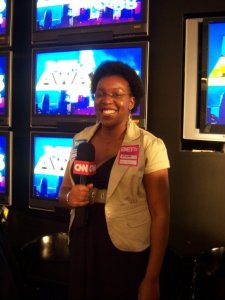Nkechi Nneji ‘07
Searching…
Born to an African African-American family, with a Nigerian father and an African American mother, Nkechi has a fairly unusual background especially considering her predominately white hometown. Her African-American, Yale-educated grandparents taught her to “work hard and do good,” while her father’s PhD functions as a testament to symbol of hard work. Yet, Nkechi’s experience of working in corporate America shows just how much misunderstanding and still exists.
Acknowledging Racial Difficulty “I think my position is a little bit unique because I am African American, but I grew up in a very, very, very, white town. Out of a town of 21,000 there were about two Black families. I say I had delay racial trauma because my Nigerian side doesn’t recognize racism – it doesn’t exist in Nigeria, everyone is black – and then my African American side stressed turning that blackness into exceptionalism. I first acknowledged racial difficulty at Smith.”
Angry Black Woman “I have a strong personality and it’s easy to be typecast as an angry black woman, but for the most part I wasn’t angry, I was strong and had to be aware that sometimes that strikes as naturally intimidating to certain people, even if they didn’t realize why. I think I do a pretty good job at not being labeled angry, but I was aware that sometimes my strong personality could have been a little intimidating to people.”
 Hair “CNN is not a buttoned-up corporate environment, so I was able to have ethnic hair and still be treated with respect. If I were working corporate banking, I’d have to straighten my hair. First Lady Michelle Obama could not have my hair. Her hair grows like mine, but she could not wear it like that, ever. What she did by letting Sasha and Malia, on occasion, wear their hair naturally did wonders. She was saying, ‘My daughters’ hair is natural and that’s okay.’ It made huge inroads in the black community. Everybody noticed it, because it was are making a statement. Huge, huge.”
Hair “CNN is not a buttoned-up corporate environment, so I was able to have ethnic hair and still be treated with respect. If I were working corporate banking, I’d have to straighten my hair. First Lady Michelle Obama could not have my hair. Her hair grows like mine, but she could not wear it like that, ever. What she did by letting Sasha and Malia, on occasion, wear their hair naturally did wonders. She was saying, ‘My daughters’ hair is natural and that’s okay.’ It made huge inroads in the black community. Everybody noticed it, because it was are making a statement. Huge, huge.”
Image, Race and Perception “I can tell you one thing about dressing – I am hyper aware that if you and I wear the same outfit and go to the store – say Louis Vuitton – we’d have two different receptions. Black people have to work harder to prove that they do belong and ‘yes, I can afford this and no, you don’t have to follow me around the store.’ My cousin and I went to Louis Vuitton last weekend and we were followed all over the store. I was wearing sneakers, jeans, a big coat and my scarf – I looked like a tourist. I had three different people say, ‘may I help you?’ I’m very aware of the earrings I wear, the shoes I wear, the length of my skirt, how low-cut my blouse is, my make up choices – all those things really make an impression.”